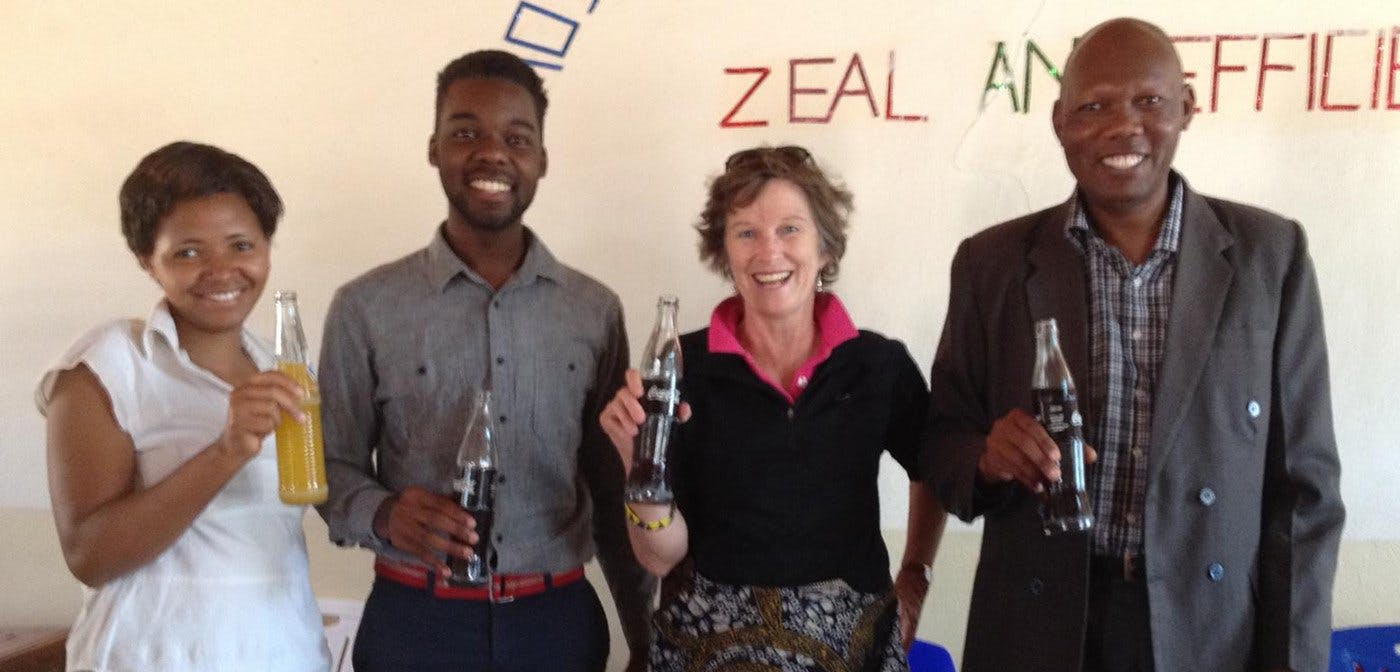When Kedmon Mapana PhD ’13 was a graduate student at Seattle Pacific, he had one consistent request for SPU education librarian Cynthia Strong: “Come to my village in Tanzania and start a library.”

“I didn’t know how to do that, so I kept saying no,” Strong said. “Just because I’m a librarian doesn’t mean I know how to start a library. He started asking me in 2009. Eventually, I couldn’t say no anymore, so I did a lot of research and figured out what I needed to do.”
In 2012, Strong flew to Tanzania and traveled to Mapana’s home village of Chamwino. When Strong first visited, Chamwino was a small village. One could walk from one side of the village to the other. There were no paved roads in the area. And, the village had intermittent electricity and no internet.
“The secondary school [high school] had a building that was designated for the library, but there was nothing in there except for the dirt floor. No glass on the windows. There were a few tattered books and maybe one bookcase,” Strong said.
Chamwino’s school library had some outdated textbooks from West Virginia. A dilapidated book on the Soviet Union. It was a classic case of “book dumping,” where donors got rid of books that were largely irrelevant to, and unwanted by, the recipients.
Strong brought a few books in her suitcase — mostly kids’ books. With input from the school’s headmaster, she purchased additional books in Tanzania. It was the humble beginning of a real library for the school.

The next year, Strong learned about Worldreader, a nonprofit based in San Francisco, California. At the time, Worldreader loaded books onto e-readers and provided them to children globally. Their model sparked in Strong the idea to raise funds to purchase e-readers, mostly Kindles, for Chamwino’s school library.
While there were challenges to using e-readers — no internet at the school initially; and limited ability to fix the e-readers if they didn’t work or were broken — it was far more economical to preload hundreds of books onto the e-readers than to purchase physical books for the students. It also fulfilled one of Mapana’s goals which was for the students in his village to gain experience with computers.
“The first time I saw a computer was when I was at university,” Kedmon Mapana said. “At the University of Dar es Salaam, computers were limited at that time. When I came to SPU — specifically at the library — there were lots of computers. They were very useful for finding materials to read.”
Mapana thought about the disadvantages he had learning computer skills as an adult and wanted young people in his home village to develop digital skills earlier in life. “I decided to invite Cindy to come to Tanzania and visit the Chamwino secondary school.”
Strong’s first visit turned into a second visit in 2014. She returned in 2017 and again in 2022 to check in on the library and also to visit friends and Mapana, who is now the executive secretary of the National Arts Council for Tanzania.
Today, Mapana’s village has paved roads and streetlights. And the secondary school has 175 e-readers, WIFI access, and a full-time librarian.
Strong’s efforts in Tanzania paved the way for another opportunity for her.
In 2022, the emerita librarian for SPU and an adjunct professor at SPU’s School of Education applied to be a Fulbright Specialist. The program, which is part of the U.S. Department of State, gives academics and professionals the chance to work on two- to six-week projects around the world. The Fulbright program awarded her a specialist grant to work with the University of Dodoma in Tanzania for six weeks starting in January 2024.
The University of Dodoma has 34,000 undergraduate and graduate students studying in the areas of law, medicine, education, the social sciences, business, informatics and virtual education, and natural and mathematical sciences.

So far, Strong has consulted on the proposed curriculum for a master’s program in Library and Information Technology and connected the University of Dodoma with the Library of Information Science programs at the University of Maryland and the University of Washington.
She’s led a workshop for doctoral students on how to create strong PowerPoint presentations, how to paraphrase, and how to ethically use chatbots like ChatGPT.
Strong met with each of the university’s six libraries and engaged them in activities that helped her learn about the libraries and students and the activities revealed how the library staff could learn from each other. Strong gave a presentation on her findings to help them develop a sustainable library system.
There’s more to cover in her remaining weeks — conduct a workshop on AI for library staff; develop a digital resource roadmap to help the Digital Resource Librarian and other librarians. The Tanzanians appreciate what Strong has done so far, but there’s a limit to what can be accomplished in six weeks.
“I’ve told the folks here, I’m not going to go home and be done. I’m still going to be in touch with these people, as these are lifelong friends,” Strong said.




